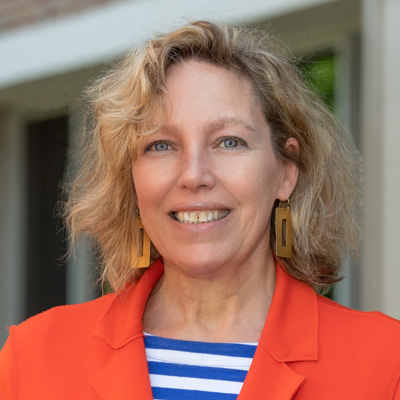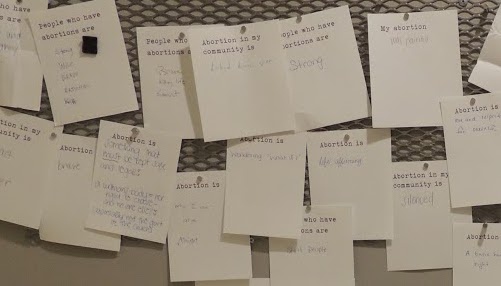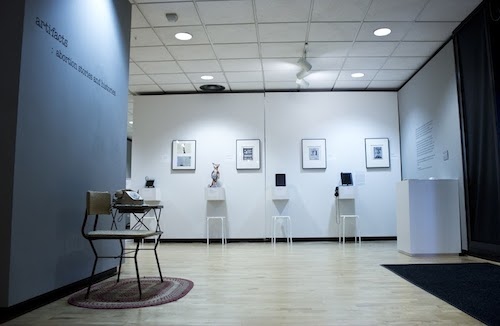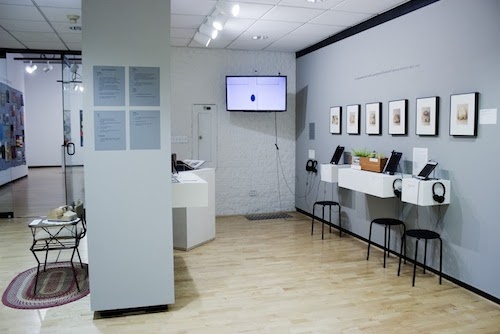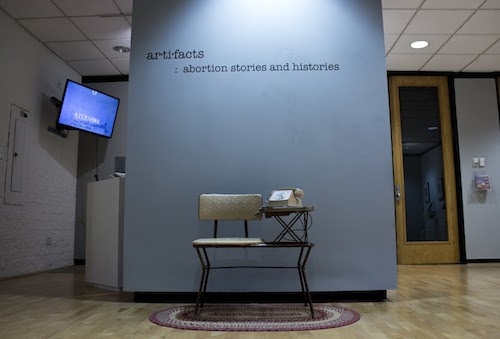In 2016, from February 15 to April 2, the Denison Museum featured a multimedia exhibition guest curated by Dr. Melissa Madera, Laura C. Harris Fellow in the Women’s and Gender Studies Program. The exhibition, titled “Artifacts: Abortion Stories and Histories,” allowed visitors to explore the human side of abortion, divorced from the political debates over access, ethics and legality.
In the whirlwind that is the current public discourse surrounding abortion, the human beings who are most impacted — the women who have abortions, their partners, their families — are often silenced, even erased. These voices, however, remind us of what is at stake in the sometimes abstracted political debates that surround this divisive issue. This exhibition comes out of Dr. Madera’s larger project, “The Abortion Diary” (http://theabortiondiarypodcast.com/), which archives hundreds of abortion stories by women, their partners, and families.
We asked students in Assistant Professor Clare Jen’s “Feminist Health Politics” to reflect upon their experience engaging with the exhibit and are posting their responses here with their permission. Students’ names are included as they chose to identify.
____
“Seeing the gallery itself felt like a radical and brave act, since abortion stories have been cloaked in so much silence for most of my life. The fact that the exhibit was there in the open, offering stories to hear, was amazing. I loved the interactiveness of the exhibit, that in order to fully experience we had to engage: pick up the phone, flip through the photo album, press play. In this way, I felt like I was involved in the movement to legitimize the sharing of such stories.
It was also useful in helping me empathize with those who have had abortions, for while I must know many, many women who have had this procedure, only a couple have shared this experience with me.”— Hannah Simon Goldman ’17
____
Dialogue is the first leap required to promote change and create action and the walls at Melissa Madera’s exhibit were certainly talking. Throughout my life I have always had unanswered questions and concerns about abortion that even the internet could not resolve, but it wasn’t a topic that I felt comfortable inquiring about or even had the means or words to do so.
As young college women, this is an issue that potentially affects our own lives and the lives of the women we know, love and interact with daily. Madera’s exhibit re-centers abortion through a framework of voicing truth and speaking/writing/creating as healing.
The attitude of shame that has seemingly hovered as a heavy cloud above the term, “abortion” is slowly and finally being replaced with the phrase, “It’s okay.” She frames personal experience as substantial evidence for promoting a change in the mindsets of people who are different from ourselves. The vulnerability and bravery of the exhibit filled the air of the museum and I felt myself breathing in the raw emotionality of the abortion artifacts. — Justine Morelli ’18
____
“National issues, such as abortion, are often illustrated by a series of statistics. Groups of women are forced into a percentage, and this has the effect of erasing their stories, their names, and their voices. Dr. Melissa Madera empowered herself and many others by bringing a personal voice back into the topic of abortion.
“Artifacts: Abortions Stories and Histories” presented by Dr. Madera at Denison University’s Museum showcases hundreds of different stories that you can listen to at different stations of the exhibit. Other areas displayed physical artifacts such as letters or art sculptures, but having the ability to actually listen to the different women’s voices had a deep impact on me personally.
We often get lost in the statistics or the politics of abortion that we forget about the real women, from college to middle aged, who have lived it for all different reasons. As I listened to one woman’s story, I could picture her sitting on her couch, trying to flesh out her memory for whoever would listen. I could then go on to another station and hear the same woman tell us why she wanted to share her story. Weeks later I can still hear her voice—the stuttering as she tried to remember all the details from her past and the inflection in her words as she lived through the experience again.
The power of these women’s voices is something I still reflect on even after visiting the exhibit, and by recording them and presenting them as artifacts, Dr. Madera has empowered these women and those who are willing to listen.” — Kirsten Elmer ’17
